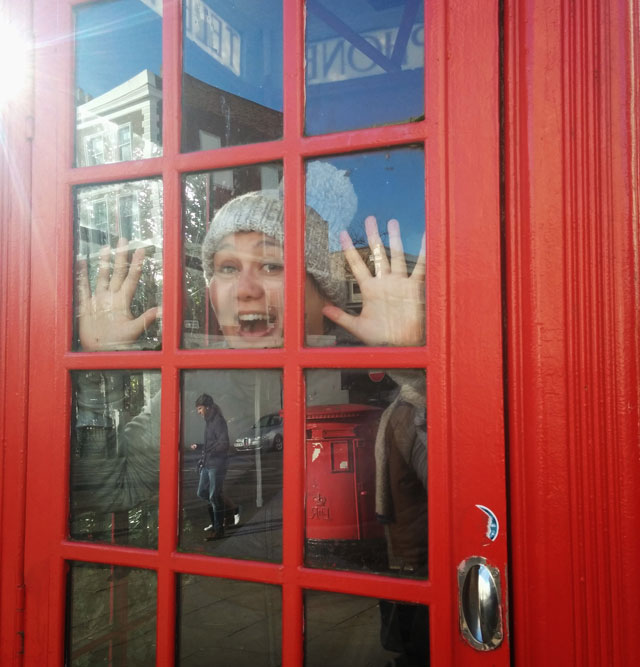5 minutes with...Jane Atkin from Lonely Planet
Working as the Online Community Manager for Lonely Planet is a dream job for UC alumni Jane Atkin, who graduated with a Bachelor of Communication in 1998. As a student she compiled a list of dream employers that she hoped to work for once completing her studies. After applying continuously for entry-level roles with the company, a maternity cover role popped up and what started as a 14-month contract has ended up lasting eight years.
For the last three-years Jane has been rebuilding the online community for Lonely Planet, developing a space for travellers to interact with each other and with Lonely Planet online. And while making the move to London was not without its challenges, it has certainly opened the door to some amazing opportunities and experiences.
We recently spoke to Jane about relocating overseas, travelling the world and what we can expect for the future of Lonely Planet.
Can you tell us about your current role at Lonely Planet?
For the last three years I have been Lonely Planet’s Online Community Manager. There are technical, commercial and legal elements to the role, but the parts I enjoy most are to do with developing the spaces where travellers can come together and interact with each other and Lonely Planet online. That can involve advice on content strategy for audiences on emerging social media platform, working with designers and software developers on new features, training parts of the business or sourcing content from users.
There is a lot of variety in the role. I also do a lot of coaching when people come into the business to make sure they are comfortable interacting with people online and understand our principles and rules of engagement.
What is it like working for Lonely Planet? Is it as exciting and interesting as we all imagine?
Lonely Planet attracts curious, independent, open-minded people. In a lot of ways it’s a very small business which means that it’s easy to make connections with other people to get things done. It’s not a very bureaucratic place to work. I love that I get to put the traveller at the heart of what we do every day. I think everyone in the company does it, but when you work in digital the feedback is instant.
My heart still skips a beat when I see people wandering around with a Lonely Planet guide book in the wild. It feels really special to be part of an organisation that helps people turn their dreams into something real. That transformation from a point on a map to being there in real life…it’s magic.
It’s a big decision to decide to leave Australia to work overseas, what made you take the big leap to working in London? Was it a dream to land a job with one of the world’s biggest companies?
Lonely Planet was definitely on my list of dream employers when I was studying. The Office of Film and Literature Classification, the Australian Security Intelligence Organisation and Lonely Planet: that was my wish list. I’d been knocked back for a couple of entry-level editorial roles at Lonely Planet. The recruitment process is pretty stringent and there’s always a lot of competition for very few roles. I ended up sneaking in a side door. The trade, reference and language division (the team that does all the books that aren’t guidebooks) were looking for someone to come in to cover some maternity leave. I started on a 14-month contract and have ended up staying for eight years.
I’d been doing project management in print publishing for a bit more than a decade so I was ready for a change. It more a question of why not?
How have you found living in London compared to Australia? Did you get any culture shocks? What are your favourite places in London?
For the first two years when anyone asked me what my favourite thing about London was, I would say ‘Heathrow’. I think the most shocking thing when I first started working in London was that the @ symbol is in a different place on a UK keyboard. Then there’s the tube etiquette. No eye contact. No talking. No standing on the left. Why do they want you to stand on the right on the elevators on the tube, even though they drive on the left in England? Why?
I think one of most perfect things you can do no matter what time of year it is have a Sunday roast at the Holly Bush Pub followed by a ramble on Hampstead Heath. There are so many great free museums and galleries in London that you can keep yourself amused forever, but my favourite is the V&A, followed very closely by British Museum.

You’ve been involved in the development of social media and the development and management of the community digital platform for Lonely Planet. Can you tell us what we can expect in the future for Lonely Planet? Will the way we consume content and advertising change greatly in the future?
Both content and advertising will become more user-centric as companies leverage technology to improve on serving the right information to consumers at the right time in. We put the traveller at the heart of what we do and we’re set up to respond to the ways in which people consume information. Lonely Planet will continue to do what we’ve always done, create trustworthy content that inspires people to travel the world.
You can look at an Instagram photo of the lavender fields of France or seen a Periscope from Machu Picchu or seen the Galapagos using Google Street View, but there’s nothing that can prepare you for the sounds, or smells, and tastes of being there. So long as people want to travel, Lonely Planet will be there to help you experience the world.
Do you believe that print still has a future, or should we expect to see all content on a digital platform?
People have been heralding the death of print product for as long as the internet has been around. In the same way that there’s room for online audio streaming and vinyl, the format may vary depending on the traveller’s preference.
Have you had the chance to explore the world from working at Lonely Planet?
I don’t think I would have had the opportunity to see behind the scenes of Eurovision in Vienna if I hadn’t been working for Lonely Planet. That was a wonderful and pretty bizarre experience. I’ve managed some side-trips to New Orleans and Mexico which I probably wouldn’t have done if I hadn’t been working for Lonely Planet. That’s probably one of the great myths about Lonely Planet. Our writers get to do most of the exploring. The rest of us mainly have desk jobs.
Do you have a career highlight of your journey so far?
Being entrusted with rebuilding the home of Lonely Planet’s online community, the Thorn Tree travel forums, from scratch. That was terrifying but it felt like fun because we had such a great team working on the project that every day felt like an adventure. I’m really proud of what we built and hope that it will serve travellers well for at least another 20 years. I like that technology affords us so many new ways to collaborate with travellers. The landscape is always changing.
Do you have any advice for students or young alumni hoping to one day work for a large global company like Lonely Planet?
My advice is to work out what you enjoy doing and try to work out which companies need people that do that sort of work. Look for companies that do work that aligns with your personal values. I don’t believe that a brand can have values, people have values and people power brands. Having said that, at Lonely Planet, we believe that travel is a force for good.
Be persistent. If you want to be a writer, write. It takes so many different types of people to make Lonely Planet work. There are roles in accounts, in project management, in cartography, in software development, in editing, in marketing. I’d say that university is just the first step in what should be a lifetime of learning. Be prepared to unlearn and relearn. Do things that scare you from time to time. (Unless that thing might kill you.) My path to Lonely Planet wasn’t the most direct one, so take this advice with a grain of salt. Your mileage may vary.
 | Jane AtkinBachelor of Communication, University of Canberra (1998)Jane Atkin graduated from the University of Canberra with a Bachelor of Communication in 1998. She has been living and working in London since 2008 for Lonely Planet in numerous roles including Project Manager for the Trade and Reference division, Community moderator and most recently as the Online Community Manager. You can connect with Jane via LinkedIn. |


